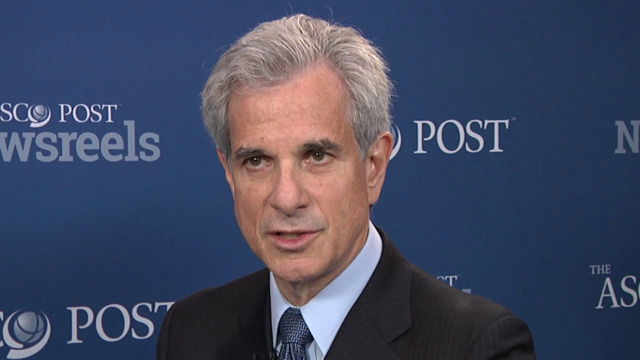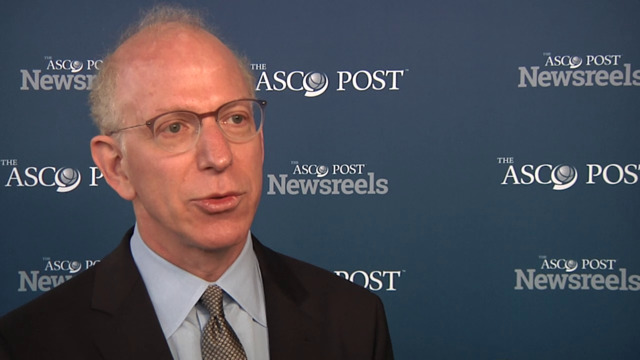Highlights From the 2016 AACR Annual Meeting
This year’s Annual Meeting of the American Association for Cancer Research (AACR) featured outstanding research in the field of cancer, as well as an inspiring talk by Vice President Joe Biden (see the May 10 issue of The ASCO Post). Here are some summaries of studies that warrant attention; they...
NCCN Clinical Practice Guidelines in Oncology (NCCN Guidelines®): 2016 Guidelines
In 1996, the National Comprehensive Cancer Network (NCCN®) published its first set of Clinical Practice Guidelines in Oncology® (NCCN Guidelines®), covering eight tumor types. The NCCN Guidelines® are now published for more than 60 tumor types and topics. Some of the key updates for 2016 were...
French Trial Shows Benefit of Adding Short-Term Hormone Therapy to Salvage Radiotherapy for Rising PSA After Prostatectomy
In the phase III GETUG-AFU 16 trial reported in The Lancet Oncology, Carrie et al found that adding short-term androgen suppression therapy to salvage radiotherapy was associated with improved biochemical or clinical progression-free survival among patients with prostate cancer who exhibited rising ...
AUA 2016: IsoPSA, a Novel, Structure-Based Biomarker Test for Prostate Cancer, Explored in a Multicenter Prospective Trial
A promising new test is detecting prostate cancer more precisely than current tests by identifying molecular changes in the prostate-specific antigen (PSA) protein, according to Cleveland Clinic research presented at the 111th Annual Scientific Meeting of the American Urological Association (AUA)...
AUA 2016: Relationship Between Testosterone Therapy and Prostate Cancer Explored
Men with low levels of the male sex hormone testosterone need not fear that testosterone replacement therapy will increase their risk of prostate cancer. This is the finding of an analysis of more than a quarter-million medical records of mostly white men in Sweden, research led by investigators at ...
AUA 2016: Cell-Cycle Progression Score Provides Significant Prognostic Information in Patients With Gleason Score < 7
Myriad Genetics announced results from a study of the prognostic information provided by its Prolaris test in patients with prostate cancer and a Gleason score < 7 at the 111th Annual Scientific Meeting of the American Urological Association (AUA) (Abstract MP02-20). Prolaris is a novel 46-gene ...
AUA 2016: BRCA Gene Mutations Associated With Increased Prostate Cancer Risk
Though predominantly known for their increased associations with breast cancer risk, germline mutations in the BRCA1 and BRCA2 genes are also associated with an increased susceptibility to other diseases, including prostate cancer. New data being presented during the 111th Annual Scientific Meeting ...
AUA 2016: Adjuvant Chemotherapy After Radical Prostatectomy May Benefit Men at High Risk for Relapse
Not all men with prostate cancer benefit from adjuvant chemotherapy after radical prostatectomy; however, African American men and men with a higher tumor stage may, according to a new U.S. Department of Veterans Affairs (VA) study (Abstract PI LBA 06) featured at the 111th Annual Scientific...
Moving Forward in Castration-Resistant Prostate Cancer: The TERRAIN and STRIVE Studies
It was over 2 decades ago that my colleagues and I reported in The New England Journal of Medicine that a first-generation oral antiandrogen, flutamide, when added to a luteinizing hormone–releasing hormone (LHRH) agonist, improved survival by nearly 6 months compared to an LHRH agonist alone in...
Enzalutamide Produces Large Progression-Free Survival Benefit vs Bicalutamide in Two Trials in Castration-Resistant Prostate Cancer
In the randomized phase II TERRAIN trial reported in The Lancet Oncology, Neal D. Shore, MD, of Carolina Urologic Research Center, Myrtle Beach, and colleagues found that use of the androgen receptor inhibitor enzalutamide (Xtandi) more than doubled median progression-free survival vs bicalutamide...
Stereotactic Body Radiation Therapy May Offer a Higher Cure Rate in Prostate Cancer Than More Traditional Approaches
A 5-year study published by Hannan et al in the European Journal of Cancer showed that stereotactic body radiation therapy (SBRT) to treat prostate cancer offers a higher cure rate than more traditional approaches, according to researchers at UT Southwestern Medical Center Harold C. Simmons...
Severe Adverse Event Clusters Identified Using NCI Common Terminology Criteria
Using the National Cancer Institute’s Common Terminology Criteria for Adverse Events (CTCAE), researchers from Columbia University, New York, and Fred Hutchinson Cancer Research Center, Seattle, identified six severe adverse event clusters in patients with advanced prostate cancer. The clusters...
Choline Kinase Alpha as Androgen Receptor Chaperone and Prostate Cancer Target
As reported in the Journal of the National Cancer Institute, Asim and colleagues found that choline kinase alpha (CHKA) acts as a chaperone for the androgen receptor (AR) and may serve as a therapeutic target in prostate cancer. CHKA expression was found to be androgen regulated in cell lines,...
Active Surveillance Has Become Standard Care for Men With Low-Risk Localized Prostate Cancer
Active surveillance has been increasingly adopted as a standard approach for men with Gleason score ≤ 6 localized prostate cancer, with major guidelines and consensus statements encouraging this approach,1 including a recently published guideline from Cancer Care Ontario (CCO),2 and endorsement of...
ASCO Endorses Cancer Care Ontario Guideline on Active Surveillance for Management of Localized Prostate Cancer
As reported by Ronald C. Chen, MD, MPH, of the University of North Carolina at Chapel Hill, and colleagues in the Journal of Clinical Oncology, ASCO has endorsed, with qualifications, the 2015 Cancer Care Ontario (CCO) guideline on active surveillance for management of localized prostate cancer....
Hypofractionated Radiotherapy Not Inferior to Conventional Radiotherapy in Low-Risk Prostate Cancer
Hypofractionated radiotherapy was not inferior to conventional radiotherapy in terms of disease-free survival among men with low-risk prostate cancer, according to the results of the phase III NRG Oncology RTOG 0415 trial reported in the Journal of Clinical Oncology by Lee et al. However, it was...
Preclinical Studies Show Many Androgen-Deprivation Therapies May Suppress Adaptive Immune Responses
Prostate cancer patients and their doctors may want to think twice about the best timing for chemotherapy or radiation therapy in conjunction with a common nonsurgical treatment, based on international research findings led by UT Southwestern Medical Center investigators. Researchers using mouse...
Significantly Increased Risk of Noncancer Hospitalizations Following Diagnosis of Prostate Cancer in the Elderly
Elderly men had a significant increase in the risk of noncancer hospitalizations following the diagnosis of prostate cancer, according to a population-based retrospective cohort study conducted by Amit D. Raval, PhD, and colleagues at West Virginia University, Morgantown. Results were published in...
Adding 6 Months of Androgen Suppression to Radiotherapy Improves Disease-Free Survival in Intermediate- and High-Risk Prostate Cancer
In the phase III EORTC 22991 trial reported in the Journal of Clinical Oncology, Bolla et al found that the addition of 6 months of androgen suppression to radiotherapy improved biochemical and clinical disease-free survival in patients with intermediate- and high-risk prostate cancer. Study...
Decreased PSA Screening and Decreased Diagnosis of Early-Stage Prostate Cancer
Recent data indicate that the rate of prostate-specific antigen (PSA) screening and the rate of diagnosis of early-stage prostate cancer have decreased since a 2012 U.S. Preventive Services Task Force (USPSTF) statement (released in October 2011) gave a grade D recommendation against PSA...
Throwing Out the Baby With the Bathwater: A Critical Appraisal of the USPSTF Recommendation Against Screening for Prostate Cancer
In 2012, the U.S. Preventive Services Task Force (USPSTF) issued a recommendation against routine screening for prostate cancer.1,2 The grade D recommendation was considered controversial at the time, and remains so now, because many stakeholders have weighed the same body of evidence and come to...
Widely Cited Prostate-Specific Antigen Screening Publications Influence Biopsy Rates and Associated Complications
While absolute rates of biopsy and postbiopsy complications have decreased following several benchmark prostate-specific antigen (PSA) screening publications, the relative risk for each patient continues to increase, according to a new study by Mayo Clinic researchers. The study is the largest to...
Lower Vitamin D Levels Associated With Adverse Pathology at Prostatectomy in Men With Localized Prostate Cancer
In a study reported in the Journal of Clinical Oncology, Nyame et al found that lower serum 25-hydroxyvitamin D (25-OH D) levels were associated with an increased likelihood of adverse pathology at radical prostatectomy in men with localized prostate cancer. Study Details The cross-sectional...
Survival Differs With Metastatic Site in Castration-Resistant Prostate Cancer
Overall survival differed according to the site of metastases in men with castration-resistant prostate cancer, according to a meta-analysis reported in the Journal of Clinical Oncology by Halabi et al. Study Details The study involved data from 8,820 men who received docetaxel chemotherapy in...
Enzalutamide Improves Progression-Free Survival vs Bicalutamide in Nonmetastatic and Metastatic Castration-Resistant Prostate Cancer
Treatment with enzalutamide (Xtandi) tripled median progression-free survival vs bicalutamide in patients with nonmetastatic or metastatic castration-resistant prostate cancer, according to the phase II STRIVE trial reported in the Journal of Clinical Oncology by Penson et al. Study Details In...
New High-Intensity Focused Ultrasound Advances Treatment for Prostate Cancer
For the estimated 220,000 men who will be diagnosed with prostate cancer this year, deciding on a method of treatment can be a challenge. Some with early-stage cancer pursue active surveillance, while others with more severe cancer immediately pursue surgery, including prostatectomy. Others fall...
Biomarkers in Prostate Cancer: PARP Inhibitors and Defects in DNA Repair
New data on molecular biomarkers in advanced prostate cancer are accumulating at a fast pace. The studies in this area can now be broadly grouped in two distinct areas—those that broadly relate to androgen signaling and those that relate to DNA-repair pathways. The Androgen-Signaling Pathway With...
PARP Inhibitor Olaparib Produces High Response Rate in Metastatic Prostate Cancer With DNA-Repair Defects
In the TOPARP-A phase II trial reported in The New England Journal of Medicine, Joaquin Mateo, MD, of the Institute of Cancer Research and The Royal Marsden in London, and colleagues, found that the PARP inhibitor olaparib (Lynparza) produced a high response rate in patients with previously treated ...
Hypofractionated Radiotherapy Not Noninferior to Standard Radiotherapy in Late Genitourinary and Gastrointestinal Toxicity in Prostate Cancer
Hypofractionated radiotherapy was not noninferior to conventionally fractionated radiotherapy in late genitourinary and gastrointestinal toxicity in patients with prostate cancer in the Dutch phase III HYPRO trial. These findings were reported by Aluwini et al in The Lancet Oncology. An earlier...
Severe Adverse Event Clusters Identified Using NCI Common Terminology Criteria in Advanced Prostate Cancer
Using the National Cancer Institute’s Common Terminology Criteria for Adverse Events (CTCAE), researchers from Columbia University, New York, and Fred Hutchinson Cancer Research Center, Seattle, identified six severe adverse events clusters in patients with advanced prostate cancer. The...
Hypofractionation Is Ready for Prime Time in Prostate Cancer, but Will It Be Adopted?
Separate phase III trials presented at the 2016 Genitourinary Cancers Symposium demonstrated that modest hypofractionated radiotherapy is noninferior to conventional radiotherapy for men with intermediate- and low-risk prostate cancer and should be considered a new standard of care.1,2 However, it...
Study Links Normal Stem Cells to Aggressive Prostate Cancer
A study that revealed new findings about prostate cells may point to future strategies for treating aggressive and therapy-resistant forms of prostate cancer. The study proved that the prostate basal cell layer contains adult stem cells, which possess a unique gene-expression profile resembling the ...
Light Reflectance Technique May Improve Ability to Remove Prostate Cancer During Surgery
Researchers at UT Southwestern Medical Center have determined that light reflectance spectroscopy can differentiate between malignant and benign prostate tissue with 85% accuracy, a finding that may lead to real-time tissue analysis during prostate cancer surgery. These findings were reported...
ASCO Endorses Cancer Care Ontario Guideline on Active Surveillance for Management of Localized Prostate Cancer
As reported by Ronald C. Chen, MD, MPH, of the University of North Carolina at Chapel Hill, and colleagues in the Journal of Clinical Oncology, ASCO has endorsed, with qualifications, the 2015 Cancer Care Ontario (CCO) guideline on active surveillance for management of localized prostate cancer....
Active Holistic Surveillance May Prevent Unnecessary Biopsies in Low- and Low/Intermediate-Risk Prostate Cancer
The use of prostate-specific antigen (PSA) screening has led to a dramatic rise in the number of men diagnosed with low-grade prostate cancer. Active surveillance is recommended to manage patients with favorable-risk, low-grade prostate cancer, with the goal of avoiding overtreatment of these...
New Technology to Characterize Circulating Tumor Cells Suggests Better Treatment Decision-Making in Prostate Cancer
An early study showed that an experimental blood test (ie, “liquid biopsy”) that characterizes the phenotype and genomic characteristics of circulating tumor cells appears to have utility in personalizing treatment decisions for individual men with advanced prostate cancer.1 The assay—developed and ...
Study Finds Enzalutamide Increases Progression-Free Survival vs Bicalutamide in Metastatic Prostate Cancer
Use of the androgen receptor–inhibitor enzalutamide (Xtandi) more than doubled progression-free survival vs the nonsteroidal antiandrogen bicalutamide in patients with metastatic prostate cancer progressing on androgen-deprivation therapy, according to the randomized phase II TERRAIN trial...
Similar Low Incidence of Bowel Symptoms With Hypofractionated vs Conventionally Fractionated Radiotherapy in Localized Prostate Cancer
As reported by Wilkins et al in The Lancet Oncology, 2-year patient-reported outcomes in a UK phase III trial (CHHiP) substudy have shown a similar low incidence of bowel problems among patients with intermediate-risk localized prostate cancer receiving hypofractionated vs conventionally...
Increased Survival and Toxicity With Docetaxel, No Apparent Benefit of Zoledronic Acid in Prostate Cancer
As reported in The Lancet by James et al, results of the STAMPEDE trial, which used a multiarm, multistage seamless phase II/III design, showed increased survival and toxicity with docetaxel and little benefit of zoledronic acid when added to first-line long-term hormone therapy in patients with...
Dose-Intensified vs Standard Salvage Radiation for Biochemically Recurrent Prostate Cancer After Prostatectomy
Initial results of a European phase III trial (SAKK 09/10), reported in the Journal of Clinical Oncology by Ghadjar et al of the Swiss Group for Clinical Cancer Research, showed little difference in acute toxicity with salvage radiotherapy of 70 vs 64 Gy in patients with biochemical recurrence of...
Study Finds Association Between Androgen-Deprivation Therapy in Prostate Cancer and Risk of Alzheimer’s Disease
In a retrospective analysis reported in the Journal of Clinical Oncology, Nead et al found that use of androgen-deprivation therapy in the treatment of prostate cancer was associated with an increased risk of subsequent Alzheimer’s disease. Study Details In the study, a text-processing...
Andrew J. Armstrong, MD, ScM, on New Treatment Options in Castration-Resistant Prostate Cancer
Andrew J. Armstrong, MD, ScM, of Duke Cancer Institute, discusses the recent practice-changing landmark studies that showed significant increases in survival for men with castration-resistant prostate cancer and led to updates in the NCCN Guidelines for this disease.
Derek Raghavan, MD, PhD: Roundup of Clinical Trial Results on Genitourinary Cancers
Derek Raghavan, MD, PhD, of the Levine Cancer Institute, gives his insights into key genitourinary cancer clinical trials presented at the 2015 ASCO Annual Meeting and his thoughts on where the research is headed.
Nicholas David James, MD, PhD, and Celestia S. Higano, MD, on Results From the STAMPEDE Trial on Hormone-Naive Prostate Cancer
Celestia S. Higano, MD, of the University of Washington, and Nicholas David James, MD, PhD, of Warwick Medical School, discuss data showing improvements in survival from adding docetaxel in men starting long-term hormone therapy for the first time (Abstract 5001).
Howard M. Sandler, MD, and Christopher Sweeney, MBBS, on Results of the RTOG 0521 Trial on Localized, High-Risk Prostate Cancer
Christopher Sweeney, MBBS, of Dana-Farber Cancer Institute, and Howard M. Sandler, MD, of Cedars-Sinai Medical Center, discuss the improvement of overall survival with the use of adjuvant chemotherapy following androgen suppression and radiotherapy (Abstract LBA5002).
Christian Carrie, MD, and Celestia S. Higano, MD, on Results of the GETUG-AFU 16 Trial on Prostate Cancer
Christian Carrie, MD, of Centre Léon Bérard, and Celestia S. Higano, MD, of the University of Washington, discuss short hormonal therapy and radiotherapy as salvage treatment for relapse after radical prostatectomy (Abstract 5006).
Howard I. Scher, MD, on the Prostate Cancer Working Group 3 Consensus
Howard I. Scher, MD, of Memorial Sloan Kettering Cancer Center, discusses the updated criteria that will guide clinical trial design and conduct for therapeutics being tested in castration-resistant prostate cancer (Abstract 5000).
Howard M. Sandler, MD, Summarizes Results of the RTOG 0521 Trial on Localized, High-Risk Prostate Cancer
Howard M. Sandler, MD, of Cedars-Sinai Medical Center discusses the improvement of overall survival with the use of adjuvant chemotherapy following androgen suppression and radiotherapy (Abstract LBA5002).
Christopher Sweeney, MBBS, Summarizes the ENZAMET and ENZARAD Trials for Prostate Cancer
Christopher Sweeney, MBBS, of Dana-Farber Cancer Institute discusses the EnzaMet and EnzaRad study designs, eligibility requirements, and endpoints (Abstracts TPS5077 and TPS5078).
Christopher J. Recklitis, PhD, MPH, on The Risk of Suicide After a Cancer Diagnosis
Christopher J. Recklitis, PhD, MPH, of the Dana-Farber Cancer Institute, discusses what is known about suicide after cancer, the risks faced by prostate cancer patients within the first year after diagnosis, and challenges across the treatment trajectory









